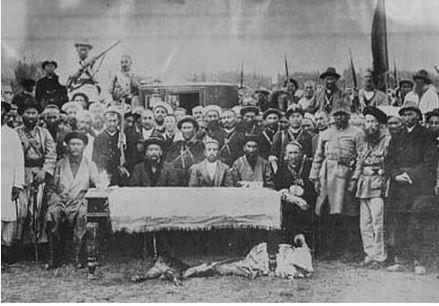
The Uyghurs are a Turkic people originally from Central Asia and now live primarily in the Chinese region of Xinjiang. They belong to the larger ethnic group of Turks, speak a Turkic language (Uyghur), and have a long history strongly influenced by Islamic culture.
🏔️ Geography and Origin:
The Uyghurs are primarily located in the Xinjiang Uyghur Autonomous Region in western China.
Historically, they originated from the oasis cities of Central Asia, such as Turkestan, Samarkand, and Bukhara. The Uyghurs are thus deeply rooted in the history of the Silk Road, which influenced their culture and trade throughout Asia and beyond.
🌍 Culture and Religion:
The Uyghurs are predominantly Muslim (mainly Sunni), and their faith plays a central role in their lives. Islam came to their region over the centuries and has had a profound impact on their art, literature, and architecture.
Uyghur culture is rich in folk music, dance, literature, and crafts. They are known for their musical traditions, such as playing the dombra (a type of long-necked lute) and their dynamic dances.
📜 History of the Uyghurs:
In the Middle Ages, the Uyghurs were an important part of the Uyghur Khaganate (Turkic empires), which played a significant role in the history of Central Asia. They were known for their state organization, trade relations, and cultural flourishing.
The Uyghurs were later under the control of various empires, including the Mongol Empire and the Chinese Empire. Their region was long an important trading center along the Silk Road.
🚨 Political Situation and Human Rights:
Today, the Uyghurs are mainly located in Xinjiang, a strategic region in western China. Xinjiang is rich in natural resources, especially natural gas and petroleum, and is of strategic importance to China.
However, in recent decades, the Uyghurs have experienced oppressive policies from the Chinese government. There are reports of massive human rights violations, including:
Re-education camps for Uyghurs, which the Chinese government calls "re-education," but many Western states and human rights organizations consider concentration camps.
Restrictions on religious freedom, particularly with regard to Islam. Uyghur mosques and religious practices are severely restricted.
Surveillance and forced labor in the region.
Forced adoption of children and Uyghurs from traditional families by Chinese state authorities.
These measures are considered genocide by many international organizations, as the Chinese government is attempting to systematically destroy the Uyghurs' cultural and religious identity.
🗣️ Language:
The Uyghur language belongs to the Turkic language family and is written in an Arabic alphabet. It is the native language of most Uyghurs and plays an important role in their cultural identity.
🌱 Current developments:
Despite repressive policies, the Uyghur diaspora is active worldwide, advocating for Uyghur human rights and autonomy. Many Uyghurs live in Asia, Europe, and North America, where they seek refuge as refugees.
The situation of the Uyghurs is one of the most pressing and sensitive political and ethical issues in the world today. There are repeated attempts to draw attention to their human rights and cultural struggles.

